I’m All Right Jack (1959)
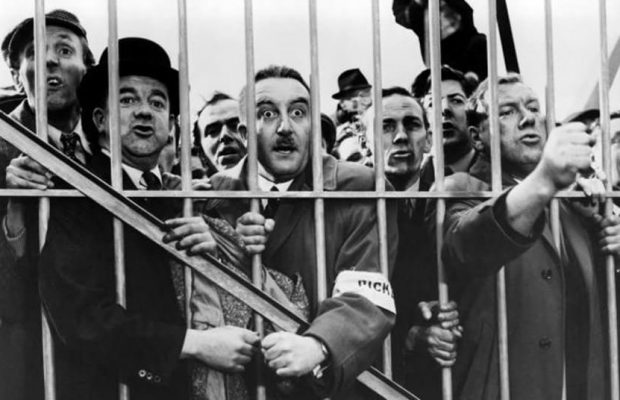
Toronto Film Society presented I’m All Right Jack (1959) on Sunday, February 25, 2018 in a double bill with The Battle of the Sexes as part of the Season 70 Sunday Afternoon Film Buff Series, Programme 5.
Toronto Film Society presented I’m All Right Jack (1959) on Monday, August 23, 2004 in a double bill with Carry On Up the Khyber as part of the Season 57 Summer Series, Programme 7.
Production Company: Charter Film Productions. Distribution Company: British Lion Films Ltd. Producer: Roy Boulting. Director: John Boulting. Screenwriters: John Boulting, Frank Harvey, and Alan Hackney based on his story “Private Life”. Cinematography: Mutz Greenbaum (as Max Greene). Editor: Anthony Harvey. Art Direction: William C. Andrews (as Bill Andrews). Makeup Artist: David Aylott (as Dave Aylott). Hair Stylist: Barbara Ritchie. Production Supervisor: Adrian D. Worker. Assistant Director: Philip Shipway. Sound Editor: Chris Greenham. Film Editor: Merril G. White. Original Music: Ken Hare. Camera Operator: Peter Allwork. Sound Recordists: Red Law and George Stephenson. Continuity: Olga Brook (as Olga Brooke). Titles: David Ffolkes and Michael Ffolkes. Music Arranger/Musical Director: Ron Goodwin. Singer (“I’m All Right Jack”): Al Saxon. Release Date: August 18, 1959.
Cast: Ian Carmichael (Stanley Windrush), Terry-Thomas (Major Hitchcock), Peter Sellers (Fred Kite/Sir John Kennaway), Richard Attenborough (Sidney De Vere Cox), Dennis Price (Bertram Tracepurcel), Margaret Rutherford (Aunt Dolly), Irene Handl (Mrs. Kite), Liz Fraser (Cynthia Kite).
In September 1959, the British Prime Minister Harold Macmillan traveled to Balmoral to ask that Parliament be dissolved. Elizabeth II, always a gracious hostess, entertained her guest by showing a movie—I’m All Right Jack (1959), starring Peter Sellers.
A social satire that reveals the one characteristic common to all the classes in Britain—strident self-interest—I’m All Right Jack brought Peter such acclaim that the force of his performance successfully distorted the satire. As conceived, written, and directed, the film is a bitter attack on postwar British industrial paralysis, the class-based antagonism, particular to the 1950s, that the historian Arthur Marwick calls Britain’s “industrial cold war.” But as performed by Peter, Fred Kite, the martinet chief shop steward at the armament factory Missiles, Ltd., is so commanding a figure of contempt and blame that all the other characters’ corruption or daftness fades away, leaving I’m All Right Jack to seem like a scathing denunciation of lazy, overpaid, communist-sympathizing trade unions.
Peter himself didn’t find the Conservatives’ landslide victory in the fall of 1959 a complete coincidence to his film’s extraordinary popularity. He is quoted as saying, “I heard the Tories liked it. It probably did more good to them than it did to Labor.”
Ironically, Peter didn’t want to do the film at all. It wasn’t because he didn’t approve of the film’s politics, which never seem to have crossed his mind. In fact, he later said he didn’t vote, never had although there were things about both parties, the Tories and the Socialists, that he liked. He supposed that some kind of Communism, however not Soviet Communism, would be the ideal, so in that case, who could he vote for? He didn’t want to do it, play the character, for the plain reason that he didn’t think his part was funny.
He later claimed to have been offered the role after playing on the director John Boulting’s cricket team in a charity match, but there was a bit more struggle behind it. As Roy Boulting, the film’s producer, describes Peter’s response to the offer: “He read it. And he didn’t want to do it. So we asked him, ‘Why, Peter?’ He said, ‘Where are the laughs? Where does one get a laugh?’ We had to explain to him as best we could that we didn’t regard him as a Goon (relating to his radio show) for this film—that he was going to be playing a real character.”
Peter grow more interested in the role, but he was also attracted by the complete package the Boulting brothers were offering. In January 1959, Peter and the Boultings announced their new five-picture nonexclusive deal, which allowed Peter to appear in other producers’ films. “It’s worth £100,000,” Peter declared. I’m All Right Jack would be the first film made under these new terms. “For an actor,” Peter explained, “a term contract is a bit like a marriage. You’ve got to have confidence in your partner.”
I’m All Right Jack was not Peter’s first picture with the Boultings. In 1958, he’d filmed a supporting role in the foreign-policy satire Carlton-Browne of the F.O. (which TFS screened four years ago in its Sunday Series) in which Terry-Thomas played the lead, although that film had not yet been released when I’m All Right Jack began shooting in January.
According to Roy Boulting, I’m All Right Jack’s Fred Kite was based on the Electricians Trades Union shop steward at another studio, an unintentionally funny little man. Because the Boulting brothers were violently against trade unions, Sellers became, through the writing, this character, representing something that they hated. He ended up making a very great film for them. The sarcastic title I’m All Right Jack refers to the Boultings’ original satirical target, the money-grubbing, every-class-for-itself attitude the filmmakers ascribe to all of England in the 1950s.
Reference: Mr. Strangelove: A Biography of Peter Sellers by Ed Sikov (2002)
Introduction by Caren Feldman
Most of us who saw I’m All Right Jack at the time of its original release on this side of the Atlantic had to have its title explained. The Labour Party was in power in England and the workers’ slogan reputedly was “It’s Alright Jack”, an expression which compressed the idea that “If we don’t work, someone else will. And someone else will cough up the welfare payments”.
I’m All Right Jack is a sequel to the Boulting brothers’ Private’s Progress (1956). Richard Attenborough, Ian Carmichael, Dennis Price, and Terry-Thomas reprise their roles from a script by the same writers (John Boulting, Frank Harvey, and Alan Hackney—author of the novel “Private’s Progress” and the story “Private Life”, upon which I’m All Right Jack is based). With the exception of Dennis Price, who appeared in only these two of the Boulting brothers’ “English comedies”, these men might be considered the Boulting brothers’ stock company. In varying combinations, at least two of them appeared in four of the six English comedies. Only Peter Sellers was to appear in more; he appeared in all of the five which were made after Private Progress (1956). But the Joker in the deck is Peter Sellers, who dominates the film in spite of having what would usually be called a supporting role, as Fred Kite, a shop steward and Head of the Works Committee. In the absence of Sellers, I’m All Right Jack would be just another droll English comedy for the Boulting brothers, with its obvious kinship to the wondrous string of English comedies that seemed to regularly come from Ealing Studios. Sellers gives one of his most nuanced performances in an essentially comedic film. His shop steward is stalwart and solemn-faced but at the same time pompous and priggish. Sellers has invented one of his remarkable accents to express Kite’s limited education and his intellectual pretensions.
The most acid and least forced scene knifing union/management relations is a meeting between Major Hitchcock (Terry-Thomas) and the Works Committee, who suspect Stanley Windrush (Ian Carmichael) is a management plant to retime their work. In fact, the Works Committee has passed the new time study man on their way into Major Hitchcock’s office. Kite: “After due deliberation, Major Hitchcock, the Works Committee has had to call a stoppage in response to our members’ wishes.” Hitchcock: “Oh, really? What precisely is the trouble?” Kite: “The members feel that the agreement negotiated with respect to time and motion studies is being contravened.” Hitchcock: “ That’s impossible. You know me. I wouldn’t do anything behind the backs of the union.” This continues until the Works Committee catches on that Windrush is not a time study man. Hitchcock: “But you are absolutely right. It’s that damn Labour Exchange, again. This man must be sacked immediately. Now you see what we are up against. Nowadays, they send us anybody, just anybody. I must say, I am really grateful to you chaps for drawing this matter to my attention. After all, it is up to the unions to help us keep out the incompetents.” The Works Committee retires to consult about this and, upon returning to Major Htichcock’s office: Kite: “My colleagues here have instructed me to put to you one question, Major.” Hitchcock: “Certainly. Go ahead, my dear fellow.” Kite: “Is it or is it not your intention to sack this man?” Hitchcock: “Sack him, of course.” Kite: “I am obliged to point out, Major, that if you sack this man, the company is in breach of its agreement with the union.”
The tendency of Peter Sellers’ Fred Kite to take over the film in memory makes it easy to overlook the obvious fact that Ian Carmichael is the presumptive “star” of both Private’s Progress (1956) and I’m All Right Jack. Kindly put, Stanley Windrush is an innocent who is incapable of understanding the world around him. Like so many of Carmichael’s characters, Stanley is charming, upper class, and—at least on a social level—not the sharpest knife in the drawer. It is not that he is not intelligent enough to do the work of either the workers or the management, but rather that he is completely impervious to the effect he has on those around him.
George Bernard Shaw thought that the public schools attended by the progeny of the upper classes were “mere shops for selling class limitations” (“Man and Superman”, Act II). Stanley, of course, does come from very old money, even though not much of it is left. Needing an income, Stanley decides to get a job in business, but proves himself unfit for management by rashly telling obvious but unsuitable truths which end his job interviews. Given his lack of understanding of even the most obvious manufacturing process, he manages to inadvertently cause chaos wherever he goes when he’s shown around a factory floor. But Stanley’s uncle, Bertram Tracepurcel (Dennis Price), sees a use for all of Stanley’s social and occupational ineptitudes in advancing his own nefarious business plans. He offers Stanley a job at his armaments factory, where he will have to start at the bottom—where he can do the most damage. His uncle, of course, tells him not to mention the fact they are related, “in the interests of industrial relations”.
The film itself is a broad satire on industrial relations, or what are today usually called labour/management relations, and—this being England at the end of the 1950s—class relations. The labour/management structure depicted in the film mirrors the Army structure from the war satirized in Private’s Progress (1956), which in turn mirrored English society: Major Hitchcock is the manager of the factory; he and another factory owner, Sidney De Vere Cox (Richard Attenborough), had served with Stanley in Private Progress (1956) as officers. All of the workers had been non-commissioned soldiers in the war.
The workers in I’m All Right Jack are all slackers, but the work being done is so simple and so easy that Stanley spontaneously outperforms all of the others; he is a natural “rate buster”. But the other workers and their union see his actions as attempts to improve productivity; that is, to change work practices. Although I never saw the England of the 1950s and 1960s, I understand that this reflected the wider situation in the English society of the time. It was difficult for anyone to move out of their class and, as the title reminds us, a worker would get paid anyway; why bother to do a good job? The representatives of management in the film—and, presumptively, in the society of the time—did not really care too much about quality or efficiency, either, since most of their business was dependent on the “old boys’ network”. It must be remembered that it was from this period into the 1970s that English industry grew ever more strike-prone and less efficient. This paved the way for the election of Margaret Thatcher in 1979 and ultimately led to the dismantling of union power in the UK.
Notes by Lloyd Gordon Ward and Robert Glen Throop

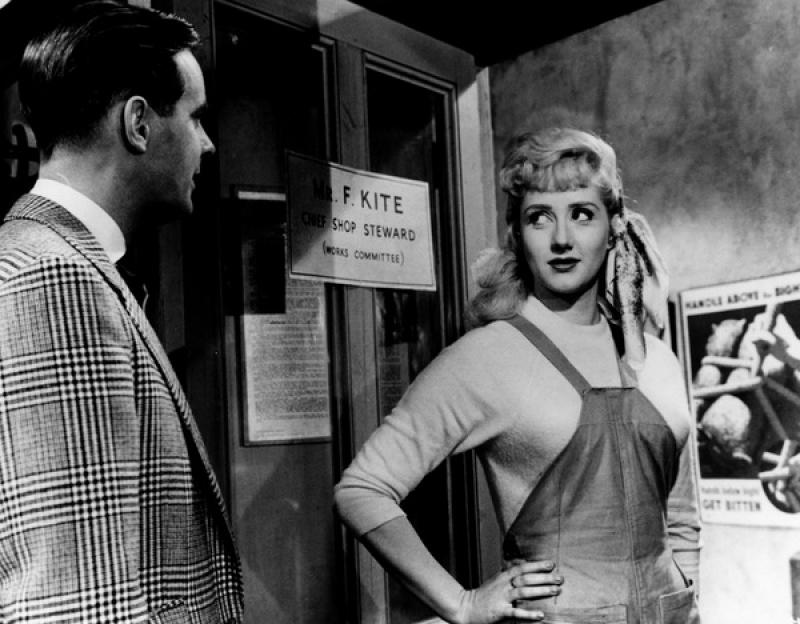
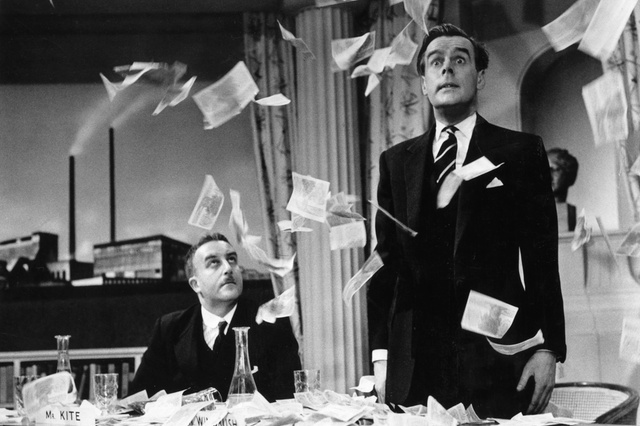
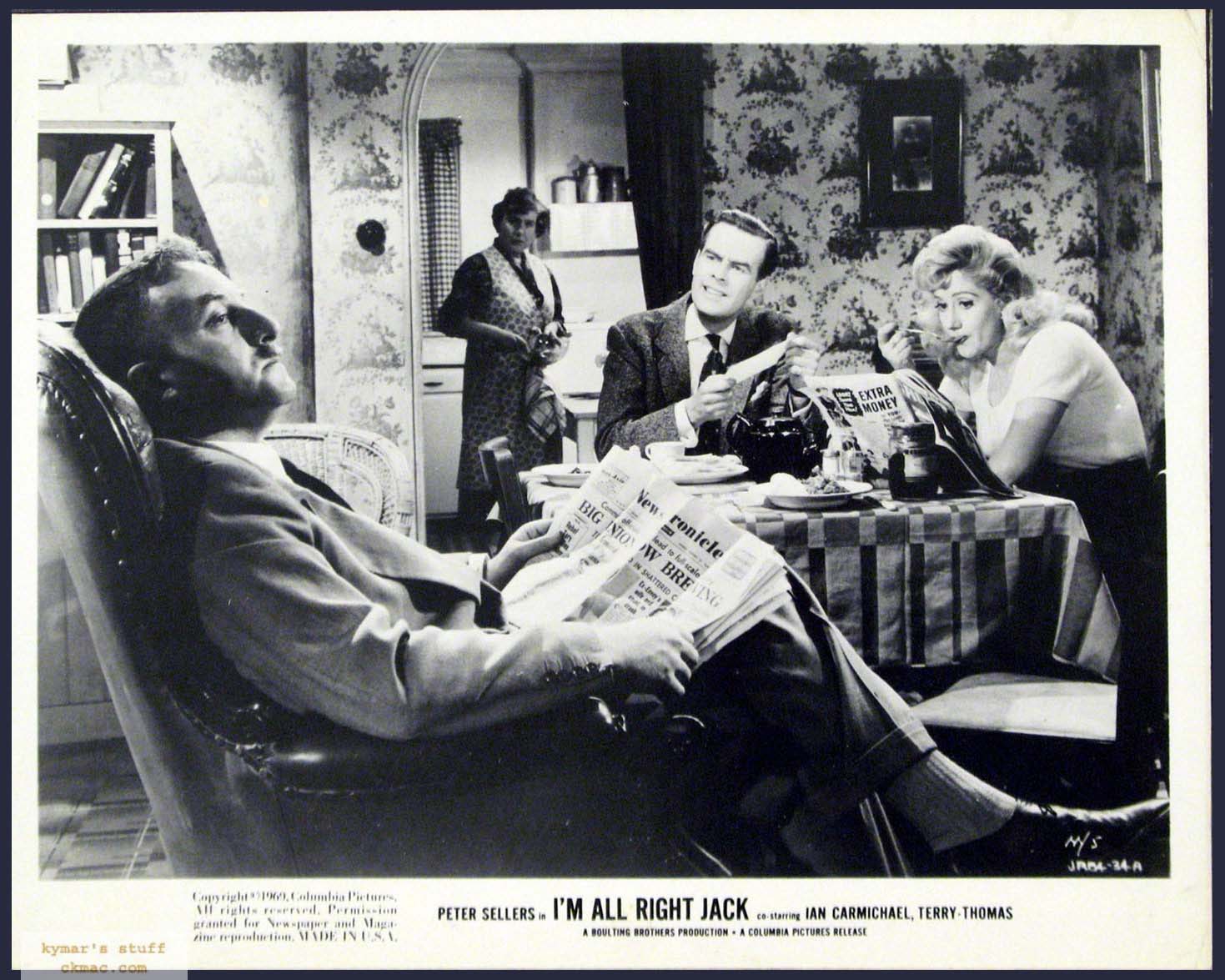
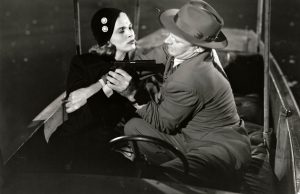
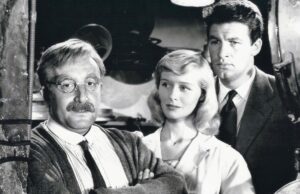
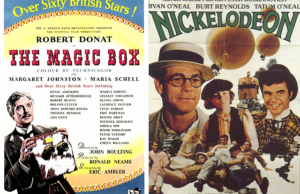






Leave a Reply